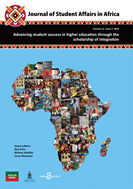Mentorship in undergraduate studies – building block for postgraduate success
DOI:
https://doi.org/10.24085/jsaa.v12i2.3950Keywords:
Mentorship, Undergraduate, Postgraduate, Socialisation, SuccessAbstract
The need to improve access and throughput in higher education programmes in SA universities, especially in relation to the improvement of postgraduate and high-quality South African postgraduate publications continues to be a policy concern. The problematic is as evident from the current higher education statistics and has been given attention through studies on entry requirements, and enrolment numbers. This paper is an inquiry into the undergraduate student experiences and how they contribute to professional identity formation and the progression to postgraduate study. The argument we explore is that experiences outside of the lecture room contribute to access and progression from under- to postgraduate studies. This is a mixed methods study of postgraduate students from various faculties in a Research-Intensive University and a Comprehensive University in South Africa. The main finding is that autonomy and agency contribute to professional identity formation and may be directly associated with postgraduate output. This is seen as important since identity is formed in social settings and social interactions and also through an individual’s own influence. Autonomy and autonomous actions can be used as a catalyst during undergraduate studies to help students access postgraduate studies.
Downloads
Published
Issue
Section
License
Copyright (c) 2024 Sindi Msimango

This work is licensed under a Creative Commons Attribution-NonCommercial-ShareAlike 4.0 International License.
Authors who publish with this journal agree to the following terms:
Authors retain copyright and grant the journal right of first publication with the work simultaneously licensed under the Creative Commons Attribution Share-alike 4.0 International License that allows others to share the work with an acknowledgement of the work's authorship and initial publication in this journal.
Authors are able to enter into separate, additional contractual arrangements for the non-exclusive distribution of the journal's published version of the work (e.g., post it to an institutional repository or publish it in a book), with an acknowledgement of its initial publication in this journal.
Authors are permitted and encouraged to post their work online (e.g., in institutional repositories or on their website) prior to and during the submission process, as it can lead to productive exchanges, as well as earlier and greater citation of published work (See: The Effect of Open Access).


